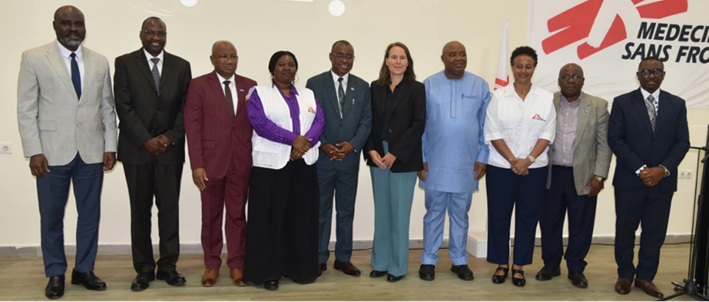By Hassan Osman Kargbo
After almost ten years of dedicated service, Médecins Sans Frontières (MSF) has officially concluded its medical support programs in Bombali and Tonkolili districts. The humanitarian medical organization announced the closure on Friday 26 September 2025, marking the end of a long-standing partnership with Sierra Leone’s Ministry of Health and Sanitation.
Since 2016, MSF teams have been at the forefront of strengthening healthcare delivery in the two districts, supporting thousands of women, children, and patients suffering from tuberculosis.
The programs, which combined direct medical assistance with health system strengthening, were designed to respond to urgent needs in some of the most underserved parts of the country.
Abi Kebra Belaye, MSF Head of Mission in Sierra Leone, described the conclusion of the project as both emotional and rewarding. “For almost a decade, our work has been driven by a commitment to serve those most in need. We leave with a deep sense of fulfilment and are proud of the achievements made in collaboration with the Ministry of Health and the communities we’ve served,” Belaye said.
The end of MSF’s direct intervention comes as Sierra Leone continues to rebuild and strengthen its healthcare system following the devastating Ebola epidemic of 2014–2016, which exposed deep gaps in health infrastructure. In the years since, MSF has played a critical role in supporting maternal and child health services, improving access to care, and ensuring treatment for diseases such as tuberculosis.
In Bombali District, MSF provided extensive support to Makeni Regional Hospital and surrounding health centres, particularly in maternal and neonatal care. Thousands of women received lifesaving interventions during pregnancy and childbirth, reducing maternal deaths in a region where access to specialized services remains a challenge.
In Tonkolili, MSF focused on expanding access to primary healthcare, ensuring children under five were treated for common illnesses like malaria, pneumonia, and diarrheal diseases.
The organization also invested in building local capacity by training Sierra Leonean health workers, improving infection prevention and control measures, and strengthening referral systems. Community outreach programs played a vital role in raising awareness about health issues and encouraging people to seek medical care early.
While MSF’s departure marks the end of an era, the organization expressed confidence that the Ministry of Health is better positioned to continue serving the needs of the population.
Officials emphasized that the partnership with MSF has left behind stronger systems, skilled professionals, and improved health infrastructure. Community members have expressed gratitude for MSF’s years of service.
Many residents in Bombali and Tonkolili recall the organization’s swift response during the Ebola outbreak and its continued commitment in the years that followed. For them, MSF’s departure is bittersweet—an acknowledgment of progress made, but also a reminder of the ongoing need for investment in healthcare.
As MSF phases out its operations in the two districts, the organization reiterated its broader commitment to Sierra Leone, where it continues to support other projects. “We may be ending our work in Bombali and Tonkolili, but MSF remains present in Sierra Leone and committed to working where the needs are greatest,” Belaye assured.













